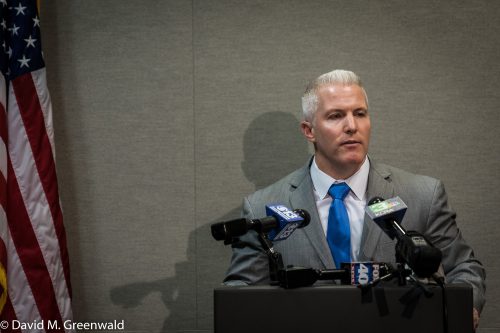
It seems like every election cycle around this time, people approach me and ask – can DA Jeff Reisig be defeated? Usually there is some controversial case that crops up to inspire it.
The reality of the situation is this: Jeff Reisig won the election in 2006 when the 20-year DA David Henderson retired. Mr. Reisig had to fight a tough electoral fight, despite having the monetary advantage and the large advantage of having the establishment, for the most part, back him. Yet it was a narrow 52-48 race.
Since then, in 2010 and 2014, he was not challenged.
What can we conclude from that? The problem is structural more than anything else. The ACLU has a program called, “What a Difference a DA Makes,” and they have found that most DAs win reelection because they do not face quality challengers and, even when they do, the voters do not know enough about their record to make an informed decision.
Polling, however, shows that DAs can be vulnerable this time around. Taylor Pendergrass notes, “The upcoming elections of local prosecutors come at a unique and potentially fragile moment. After years of steadily building power and momentum, criminal justice reformers are now facing a federal government enthralled with brutal and ineffective ’90s-era criminal justice policies. The outcome of these local prosecutor elections may prove to be the most significant in history for the movement to end mass incarceration.”
While Yolo has elected a man who has staked his reputation on tough law and order, Jeff Reisig’s record is inconsistent with the voting behavior of this county.
As we have noted, he has opposed every major criminal justice reform in the state. Every single one.
That includes two go-arounds of the death penalty reform, AB 109 (realignment to reduce the state prison population), three strikes reform, Prop. 47 (reducing certain drug possession charges to misdemeanors), and Prop. 57 (increasing parole chances for felons convicted of nonviolent crimes) this last time.
The Vanguard launched the court watch program in early 2010. This is our eighth year in the courts.
What we have found is that the Yolo DA’s office has one of the most aggressive prosecutorial approaches in the state. Yolo County is a largely rural county which has long had a crime rate in the middle of that of the state. But under Mr. Reisig’s office, we see a county that ranks No.4 in per capita prison incarceration rates, and in the top five in per capita felony charges.
Judge Dan Maguire last spring, in a jury appreciation column, wrote, “Yolo County has significantly more jury trials per capita than most California counties.”
What we have found is that the Yolo County DA’s office often will overcharge cases without making reasonable offers, thus making trials more likely which, in many cases, were unnecessary.
Still, that is perhaps not enough to unseat the sitting DA.
My strongest criticism is that he has consistently overcharged and sometimes has done so to the detriment not only of criminal defendants, but also the victims he purports to help. There are cases where the charging decisions leave you baffled. And there are cases where you just wonder why this is being charged and tried at all.
But challenging the most powerful actor in the criminal justice system is difficult.
“Research suggests that prosecutors’ ‘tough on crime’ practices have been a major driver of mass incarceration over the last several decades. Yet polls suggest that majority of the American public – across demographics and across the political spectrum – prefer second chances and treatment over long prison sentences and overflowing jails.
“If this is true, why do ‘lock ’em up’ prosecutors keep getting elected?” Pendergrass asks. Look no further than Yolo.
First is “voters say they have little understanding of what a district attorney does or the extraordinary impact a prosecutor’s decisions have on their local community.” Second we see “prosecutors operate with near impunity.” Third is “prosecutors have long shielded their actions from public scrutiny, making basic information about their policies or data on the outcomes of their decision-making unavailable. This lack of transparency prevents the public from holding prosecutors accountable.”
Beyond the structural explanation about the system, there are also specifics in Yolo County. With most elected offices, if the incumbent does not align with the voters, you find a prominent up and coming politician – one with name recognition, the ability to raise money and the ability to attract key demographic groups.
But the office of DA is rather unique. You need to find someone who is not only an attorney, but in most cases has experience not only in criminal law but prosecution.
That does not leave a lot of possibilities in a relatively small county like Yolo County. The first option would be for someone from his office to challenge him. That is highly unlikely. When he first ran, it was Mr. Reisig against his colleague Pat Lenzi. The office and his predecessor backed Mr. Reisig, it was a bitter election and Ms. Lenzi quickly left the office after being narrowly defeated.
There has been a fair amount of turnover in the DA’s office in the 11 years that Mr. Reisig has held office. During that time, two of his deputies ran for judge, but both were soundly defeated and both ended up leaving the office almost immediately thereafter.
In short, it is hard to imagine an internal challenge.
That leaves open the possibility that there is someone who works at the State Attorney General’s office who lives in Yolo County and has experience as a prosecutor. Maybe such a person exists, but it seems like a bit of a long shot.
The third possibility is that a non-prosecutor could challenge him. There is no formal requirement that the challenger have prosecution experience. Perhaps someone could emerge with a law degree who would be a formidable candidate.
That’s possible, but they would make for easy picking with the law and order types who would complain about their lack of experience as a prosecutor.
So in short, while there are certainly reasons why criminal justice reform advocates would like to challenge the DA, it seems highly unlikely at this time that one could emerge to do so.
—David M. Greenwald reporting






